8 Nov 2013 | Azerbaijan, Azerbaijan News, Europe and Central Asia, News and features
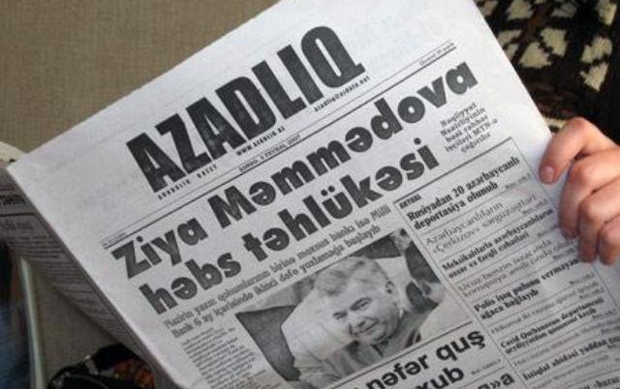
Azadliq, an independent Azerbaijani newspaper, is in danger of folding. The paper has come under severe economic pressure to silence its critical voice following the country’s presidential election.
The paper has been been the target of defamation suits that have resulted in £52,000 in fines. Courts found Azadliq guilty of “damaging” the business reputation of Kabira Mamedova, director of the Baku-based Bina shopping centre, and Taghi Ahmadov, CEO of the Baku Metro, after the paper published articles critical of their activities. Ahmadov had previously agreed to accept payments over a 10-year period, but this week reversed his decision, demanding his full £24,000 payment immediately.
As a result, the paper’s bank accounts have been frozen since 25 October. At the same time, Gasid, the state-owned press distribution company, has not been transferring payments that reflect the paper’s sales. According to Azadliq’s latest calculations, Gasid now owes about £44,000.
Azerbaijani public officials are using criminal and civil defamation against the newspaper and its journalists as a tool to stifle critical and independent journalism, Rahim Hajiyev, acting editor-in-chief of Azadliq, told Index during our pre-election mission to Azerbaijan.
“We play a significant role in providing people with alternative information. Our staff are underpaid, overworked, and yet are fully committed to their work”, said Hajiyev.
Melody Patry, Index advocacy officer, recalls:
“During Index’s mission in Azerbaijan in September, we met with Rahim Hajiyev. While greeting us, he apologised for a pitiful condition of the editorial office: ‘We used to be in another office, but we got kicked out. Now, we cannot afford even these premises. Where will we be next? Probably, in the street?’ he said. The main topic of discussion was the newspaper’s financial struggle.”
Azadliq is appealing for your help and support. The newspaper is in desperate need of funds that can ensure it can continue its operations. For information on how to make your contribution and donate to support an independent voice, click here.
This article was originally published on 8 Nov 2013 at indexoncensorship.org
1 Nov 2013 | Azerbaijan, Azerbaijan News, Europe and Central Asia, News and features
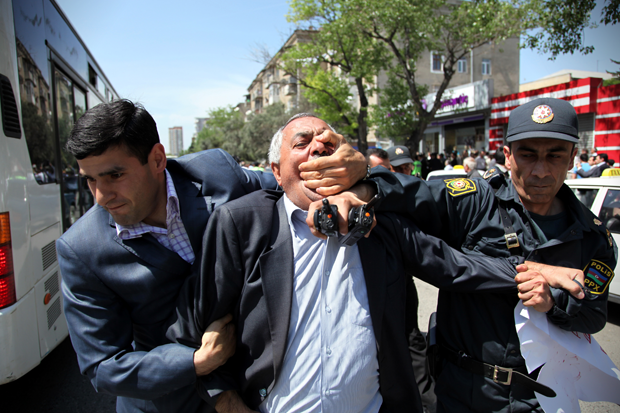
Narimanov Park, Baku, 15 May 2010. Police forcibly detain a political activist during an unsanctioned protest. Photograph by Abbas Atilay
Press release from the Institute for Reporters’ Freedom and Safety (IRFS)
Azerbaijan’s government has unleashed a massive crackdown on the civil society and media in the wake of the October presidential election, the Institute for Reporters’ Freedom and Safety (IRFS) said today.
A group of police investigators yesterday raided the office of the Election Monitoring and Democracy Studies Centre (EMDSC), the independent election watchdog that enraged the government by reporting irregularities surrounding the Azerbaijan’s election.
The raid began around 11:00 am yesterday in Azerbaijan’s capital, Baku and lasted for five hours. Computers and documents were seized. The Prosecutor General’s Office launched investigation “regarding irregularities recorded at the Election Monitoring and Democracy Studies Centre”.
The raid on the election watchdog NGO signalled a sharp and very serious escalation of the country’s deepening human rights and political crisis. “It’s a clear message to the government’s critics: ‘Don’t get involved in any issues that question legitimacy of the presidential election”, IRFS CEO and chairman Emin Huseynov said.
“The Election Monitoring and Democracy Studies Centre’s work for free and fair elections contributed to the implementation of Azerbaijan’s international commitments notably within the Council of Europe and the OSCE. The authorities must recognise this work and immediately stop harassment of the organisation”, Huseynov said.
IRFS believes that the government is conducting a carefully coordinated witch hunt aimed at discrediting critics of the government, and particularly those active in the election period.
In a separate case, one of the most vocal critics of the government, a Baku-based opposition newspaper Azadliq faces revenge in court for exposing the government corruption and reporting electoral fraud. The bank accounts of the newspaper are frozen (arrested) over huge defamation debt. ‘It’s a fairly urgent situation. The newspaper faces closure after 24 years of operation. The government has never gone so far in silencing the media’, Huseynov said.
IRFS calls on the Azerbaijani government to end its harassment of media, civil society and activists and take steps to assure that freedom of expression becomes a reality for all.
“Instead of attacking civil society organisations in Azerbaijan and beyond, the government must begin having open dialogue with them. This would allow Azerbaijani citizens to become involved in the decision-making process”, Emin Huseynov of IRFS said.
IRFS reminds that, less than a month after the presidential vote, independent media outlets and human right defenders are still facing unprecedented levels of repression and harassment and the number of prosecutions are on the increase. IRFS calls on the Azerbaijani Government to immediately release all journalists, opposition activists and human rights defenders.
IRFS condemns the failure of the Azerbaijani Government to heed calls from international and regional bodies, such as the Council and Europe, the European Union (EU), Organization for Security and Cooperation in Europe (OSCE) and the United Nations (UN) to respect and protection of human rights, including freedom of expression.
9 Oct 2013 | Azerbaijan, Azerbaijan News, News and features, Volume 42.03 Autumn 2013
In the run up to today’s Azerbaijani presidential election, we publish an article and photographs from Index on Censorship magazine showing how the authorities have cracked down on journalists, activists and artists that criticize the government. These stories of the risks journalist and photographers face show how far the regime will go to silence its critics including intimidation and prison sentences. Writers Rasul Jafarov and Rebecca Vincent document the stories of some of the country’s courageous photojournalists, who have documented what life is really like under President Ilham Aliyev.
“In authoritarian regimes, art can serve as a powerful means of expressing criticism and dissent, subverting traditional means of censorship. Photography is particularly telling, capturing the raw truth and making it difficult for even seasoned propagandists to refute. These photographs, from Abbas Atilay, Shahla Sultanova, Mehman Huseynov, Aziz Karimov, Ahmed Muxtar and Jahangir Yusif, show a side of the capital Baku that contrasts sharply with the sleek, glossy image President Ilham Aliyev’s government seeks to portray. They expose an authoritarian regime prepared to arrest those who document protests and criticism — journalists, human rights defenders, civic and political activists and even ordinary citizens.
But those who embrace subjects others prefer to avoid, exposing unsavoury truths the Azerbaijani authorities would prefer to keep hidden — such as corruption and human rights abuses — do so at significant personal risk and hardship.
As journalists, they face intimidation, harassment, threats, blackmail, attacks and imprisonment in connection with their work, which is seen as direct criticism of the authorities. As artists, they face economic hardship and restrictions on where they can display and disseminate their work.
Most of these images were taken during unsanctioned protests in Baku. Photographers face particular hazards when covering protests in Azerbaijan, as not only can they be injured in the general chaos, but they can also be singled out because of their work. The Institute for Reporters’ Freedom and Safety reports that so far in 2013 there have been 17 attacks against journalists and photographers covering protests.

Narimanov Park, Baku, 15 May 2010. Police forcibly detain a political activist during an unsanctioned protest. Photograph by Abbas Atilay
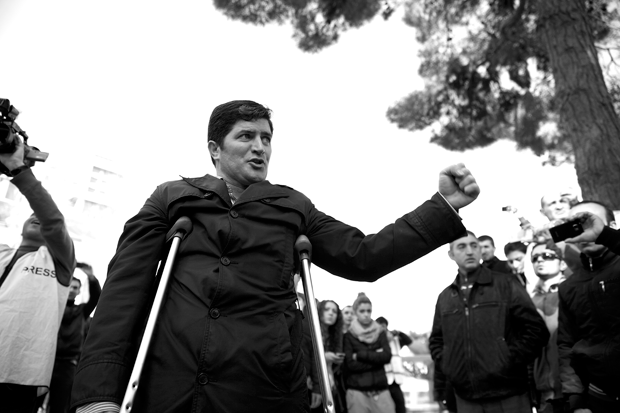
Fountain Square, Baku, 10 March 2013. A political activist during an unsanctioned demonstration protesting the deaths of military conscripts in non-combat situations. Authorities used excessive force to disperse the peaceful protest and detained more than 100 people. Photograph by Jahangir Yusif
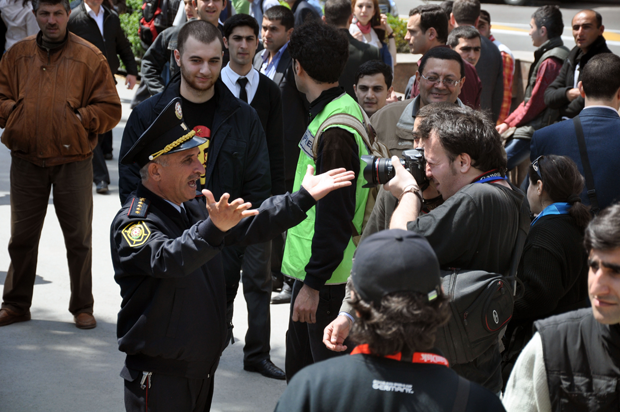
Sabir Park, Baku, 11 March 2011. During an unsanctioned political protest
in the wake of the Arab Spring, a police officer encourages journalists to take his photo. This was a rare move, which the photographer believes was intended to distract photographers from other aspects of the protest, such as police physically restraining protesters. Photograph by Mehman Huseynov
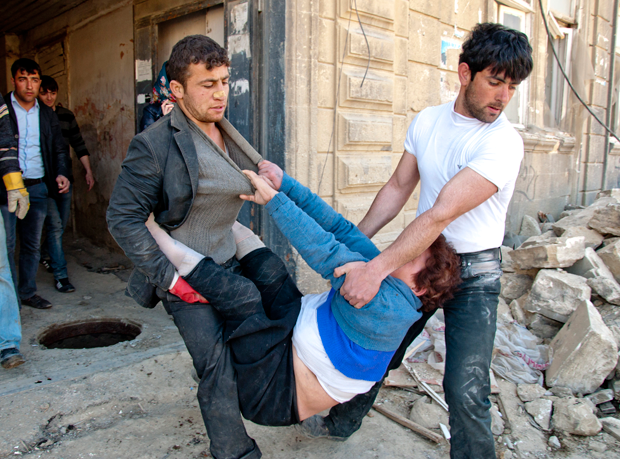
Shamsi Badalbayli Street, Baku, 2 April 2012. A resident is forcibly evicted from the area where the Winter Garden will be constructed. Approximately 300 complaints have been sent to the European Court of Human Rights related to forced evictions from this area. Photograph by Ahmed Muxtar
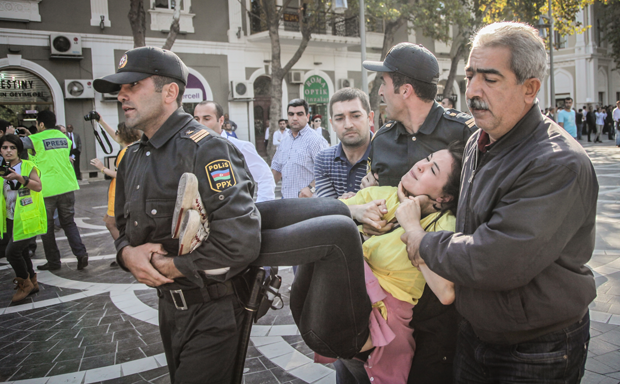
Fountain Square, Baku, 20 October 2012. Police detain a young opposition activist during an unsanctioned protest calling for parliament to be dissolved after a video was released showing an MP discussing the sale of parliamentary seats. Dozens of activists were detained during that protest. Photograph by Aziz Karimov
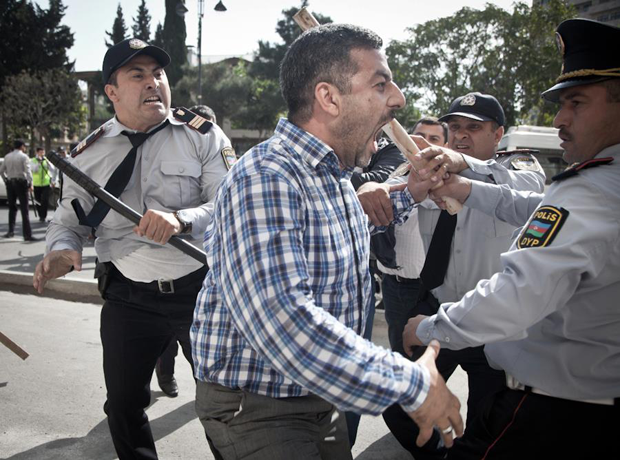
Hijab ban, 5 October 2013. Photograph by Aziz Karimov
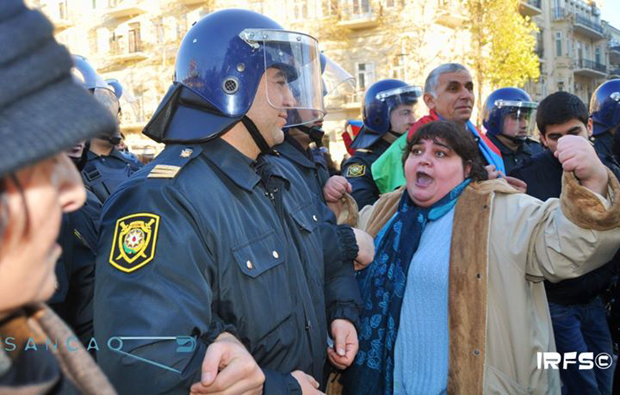
Investigative journalist Khadija Ismayilova confronts police. Photograph by Mehman Huseynov
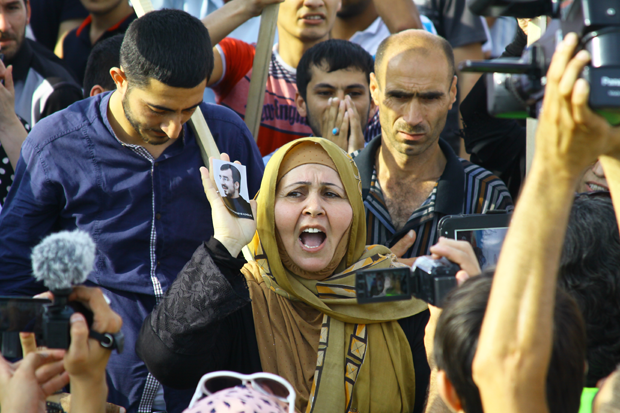
Nevreste Ibrahomova, head of Azerbaijan Islamic Party’s Women Council, holds the photo of an arrested Azerbaijani Islamist and chants freedom to him. Photograph by Shahla Sultanova
Photographers also face arrest and protracted legal action as a result of their work. Mehman Huseynov faces up to five years in prison on politically motivated hooliganism charges stemming from an altercation with a police officer during protests ahead of the Eurovision Song Contest in May 2012. The photographers featured in this story are among the few courageous individuals in Azerbaijan who remain willing to take on the risks associated with this work. They need international support and protection before they, too, become the subjects rather than the artists.”
Rasul Jafarov is the chairman of the Human Rights Club and project coordinator of the Art for Democracy Campaign. Rebecca Vincent is Art for Democracy’s advocacy director. She writes regularly on human rights issues in Azerbaijan
To find out more about the magazine and for subscription options, and read more about stories from the issue click here. These photographers will be part of an exhibition in London this winter. For more details, follow @art4democracy Join us to launch of Index on Censorship’s autumn issue on 15 October. To register for the event, click here.
8 Oct 2013 | Azerbaijan, Azerbaijan News, News and features

Looking forward to another election win. (Photo: PanArmenian / Demotix)
Tomorrow, on 9 October, Azerbaijan will hold a presidential election, with incumbent President Ilham Aliyev seeking a third term in office. Although the government and its supporters have been working hard to promote a positive image of Azerbaijan abroad, at home, they continue to crack down on citizens’ ability to exercise their basic rights and fundamental freedoms, in an apparent effort to silence all voices of criticism and dissent.
Despite superficial efforts to make the election look like a serious competition – for example, by registering a staggering 10 candidates – there is not an even playing field for all candidates. The only candidate widely agreed to be independent, united opposition candidate Jamil Hasanli, is fighting an uphill battle with limited resources against a powerful incumbent with the full resources of an oil-rich state behind him.
Below, I examine five of the main underlying issues presenting challenges to the fair and free conduct of this election, unsavoury truths that the authorities would rather not be included in reporting on this election. As a result of these and other issues, regardless of what now happens on election day, the chances of a democratic election have effectively been eliminated. The underlying climate has simply not allowed for a fair competition.
1. There are 142 people locked up for political reasons in Azerbaijan
At a press conference in Brussels in June, President Aliyev stated: “None of my political opponents is in prison. There are no political prisoners in Azerbaijan”. These claims simply are not true. A new list from the Baku-based Human Rights Club outlines 142 current cases of politically motivated detention and imprisonment in Azerbaijan. These include journalists, bloggers, human rights defenders, civic and political activists, religious followers, and ordinary citizens, many of whom were targeted for exercising their fundamental rights to freedom of expression, assembly, and association.
One of Azerbaijan’s political prisoners is the Republican Alternative (REAL) movement’s would-be presidential candidate, Ilgar Mammadov, who has been detained since February. After visiting the region of Ismayilli to investigate on-going protests, he was then charged with inciting violent protest, and faces up to 12 years in prison if convicted. Although REAL was able to gather the more than 40,000 signatures required to register a presidential candidate, the Central Election Commission declared some of the signatures invalid and refused to register Mammadov’s candidacy.
2. Aliyev has gotten far greater media coverage in the country than any of his opponents
Azerbaijan’s state-controlled broadcast media rarely shows opposition figures. Out of Azerbaijan’s nine national television stations, three are directly owned by the state, five are privately owned but controlled by the state, and the public service broadcaster, Ictimai, is failing to fulfil its role as a public service broadcaster as it does not provide balanced and varied programming. In contrast to the hours of television coverage incumbent President Aliyev receives every day throughout the year, the other presidential candidates have received only 18 minutes of airtime each week for the three weeks of the campaign period.
Three independent media outlets which have been relegated to the Internet since a 2009 ban took them off the air – the Azerbaijani services of the BBC, Radio Free Europe/Radio Liberty, and Voice of America – have been accused by the Central Election Commission of being in “propaganda mode” during the campaign period – presumably for daring to cover the opposition’s campaign activities, and not just the president’s.
3. The opposition is challenging Aliyev’s right to run for a third term
This is perhaps the most significant factor making this election stand out from previous elections in Azerbaijan, and may account for the unprecedented crackdown in the run-up to the election: the opposition claims that Aliyev does not have the constitutional right to run for a third term in office. The united opposition candidate, Jamil Hasanli, has filed a legal appeal in this regard, which will be examined by the Baku Court of Appeals today.
What is the basis of this appeal? When Aliyev came to power in 2003, and when he was re-elected in 2008, there was a two-term limit on the Azerbaijani presidency. This limit was removed through a Constitutional referendum in 2009. Hasanli and his supporters argue, however, that the changes do not apply retroactively to Aliyev, but should apply instead to his successor, meaning he does not have the right to run for a third term.
Further, University of Sydney Professor Wojciech Sadurski issued a legal opinion arguing that Azerbaijan’s removal of the term limitation was done in an undemocratic manner, contrary to the principles of openness and transparency. Sadurski considered this action to be a breach of the European Convention on Human Rights, to which Azerbaijan is party.
4. Azerbaijan has not had a fair and free election since Aliyev came to power
Including the election that brought Ilham Aliyev to power in 2003, Azerbaijan has held two presidential elections and two parliamentary elections in the past 10 years. All fell far short of meeting international standards for democratic elections, largely due to restrictions of freedom of expression and assembly in the pre-election period, resulting in a lack of robust competition and vibrant political discourse.
The Azerbaijani government seems intent on repeating its past mistakes with this election. The most recent interim report issued by the OSCE/ODIHR’s election observation mission highlighted similar problems to previous election periods, noting that the campaign period “has been marred by some reported incidents of intimidation of family members of political figures.” The report also concludes that “the campaign has lacked substantive debate and has focused on personality rather than concrete political platform” and states “the incumbent President received a much greater amount of coverage in news programmes on television in comparison to other political actors.”
5. Azerbaijan is failing to fulfil its human rights obligations with all major international bodies
The fact that Azerbaijan is failing to fulfil its human rights obligations with the Council of Europe, the OSCE, and the United Nations (UN), and its human rights agreements with the European Union, is the elephant in the room, both in the context of this election and in broader international relations with Azerbaijan.
The pattern of systematic and widespread violations of human rights by the Azerbaijani authorities is well documented. Just last week, three UN special mandates, the OSCE Representative on Freedom of the Media, and the Council of Europe Human Rights Commissioner all spoke out with concerns related to human rights violations in the pre-election period.
Despite this knowledge, the political leadership of these bodies and their member states remain reluctant to seriously address these shortcomings. As a result, the Azerbaijani authorities continue to act with impunity, certain that their failure to implement their human rights commitments will not result in serious consequences for other areas of their bilateral and multilateral relations. How then can they be expected to behave differently in this election period?
But rather than write off this election – as some international media outlets have already done, pre-emptively declaring another victory for Aliyev – the international community must take note of what happens and take a stand. International observers must report accurately and fully on the election, and the government must be held accountable for shortcomings through the full political weight of the organizations behind the reports and their individual member states. Azerbaijan cannot continue to be treated as a privileged member of the international democratic community without the credentials to back it up.
And most importantly, the international community must sustain attention to Azerbaijan well beyond the election period. Local journalists, human rights defenders, and activists fear a post-election crackdown even harsher than what occurred in the run-up to the election. If these remaining few critical voices are successfully silenced, then many more elections in Azerbaijan will follow suit as foregone conclusions.
This article was originally published on 8 Oct 2013 at indexoncensorship.org










